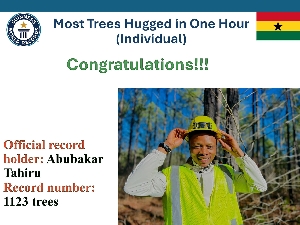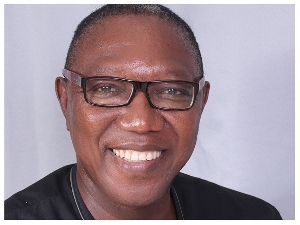 Some of the educators undergoing the training session
Some of the educators undergoing the training session
Some Special Educators who participated in a training programme on cerebral palsy on Tuesday said they have been enlightened a lot on the condition.
“We did not know that there were adaptive devices that could be used for children with cerebral palsy in the classroom.”
“We did not know that we could make adaptive equipment with cardboards and pieces of paper,” Mr Kweku Nkum Yeboah, Teacher at the Twin City Special school said in an interview with the Ghana News Agency.
Mr Yeboah said it has been a useful two weeks training session, which will enhance their work as special educators, going forward.
Mrs Patience Kyei, Special Educator at the Dansoman Community Special School, said she will communicate what she had learnt to her colleague teachers.
“Many teachers in the regular stream do not understand special education and are not able to handle children with special needs, especially cerebral palsy, but with the two weeks training, our school will be more open to accept children with cerebral palsy.”
Mrs Kyei said she is also willing to do outreach programmes on cerebral palsy in the community while making sure to also engage more with parents of children with special needs.
Mr Victor Atitsogbi, Special Educator at Three Kings Special School, Battor, said he will be organizing a trainer of trainers programme for his school to enhance their understanding on cerebral palsy.
The participants, however, urged government to be more committed to the education of children with special needs especially children with cerebral palsy in Ghana.
Children with cerebral palsy are usually very intelligent, most of the time their IQ is not affected by their disability but we do not have the infrastructure and the support we need to accept them into schools.
“We realize that there is very limited knowledge on children with cerebral palsy and all children with special needs among the rank and file of the Ghana Education Service, hence very little is said about it,” they said, emphasizing the need for government to show more commitment.
Ms Mandy Budge, Head of Multikids Africa, an organization that advocates inclusion of children with special needs and organizers of the workshop, said they intend to start a mobile therapy clinic to the various special needs school to ensure that the children get the required services.
“Our Mobile Multidisciplinary team will work together with the schools to ensure that the children get the required therapy services while in school. We also hope to extend the training programme to all teachers,” she said
Ms Budge said Multikids Africa is committed to building the capacity of teachers and therapists locally to ensure continuity and sustainability of the training programme.
“We will also put in place an effective monitoring team to ensure that the right thing is being done,” she added.
The training programme for Special Educators in selected special schools is aimed at creating a group of teachers and university lecturers, who will be able to incorporate children with cerebral palsy in the education environment.
The project on the theme: Enabling Education for children with cerebral palsy in Ghana, also hopes to enhance the human resource capacity of professionals working with persons with cerebral palsy.
Two paediatric physiotherapists from the United Kingdom, Diane Lyle and Sophie Appleby provided practical hands on training to the teachers to enhance their knowledge on basic therapies they can do with the children in the classrooms, while Ms Jean Westmacott, Head of CPA equipment trained the teachers in the making of the Appropriate Paper-based technology equipment.
The programme, funded by UK Aid Direct, with support from Cerebral Palsy Africa, Multikids Africa and SWEB Foundation, will also equip the teachers to demonstrate strategies to sensitize communities on the needs of children with cerebral palsy and the benefits that education can bring them.
- Meet the only teacher taking care of an entire school in Afram Plains
- U.S. provides GH¢2.8 Million to aid licensing, monitoring and evaluation of schools
- Each One, Teach One: ADN kicks off Lifeline Literacy Project
- Parenting with a difference 101: Cheating in classwork a threat to national development
- GH¢68.5m for WASSCE passco - Minority wants OSP to probe expenditure
- Read all related articles












